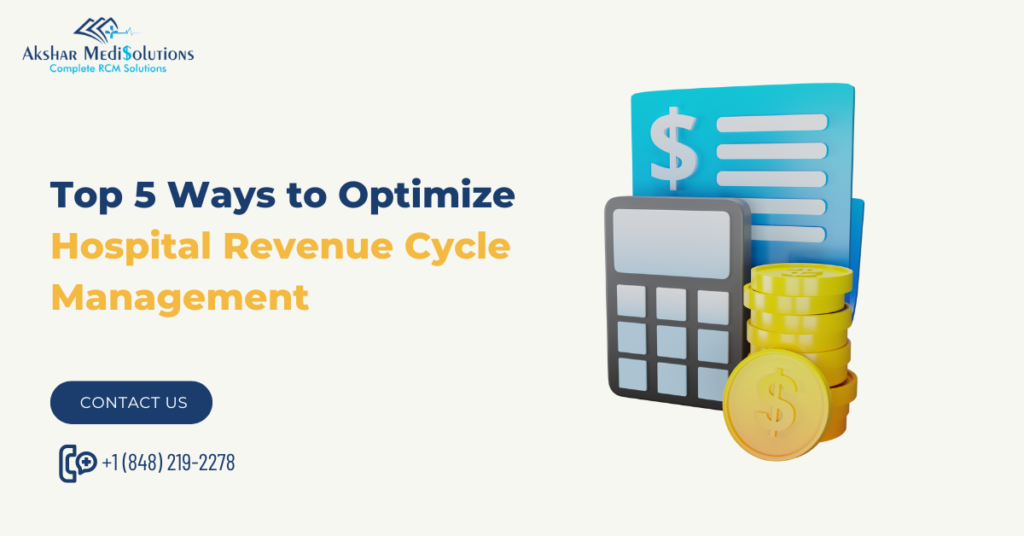Top 5 Ways to Optimise Hospital Revenue Cycle Management
- Get link
- X
- Other Apps

Hospital Revenue Cycle Management
Effective revenue cycle management (RCM) is crucial for hospitals to maintain financial health and operational efficiency. It encompasses the entire process from patient registration and appointment scheduling to claims processing and reimbursement. Optimizing RCM involves streamlining workflows, reducing inefficiencies, and maximizing revenue capture. In this blog, we explore five key strategies to enhance hospital revenue cycle management.
Enhance Patient Registration and Insurance Verification Processes
The revenue cycle begins with patient registration and insurance verification. Optimizing these processes ensures accurate demographic and insurance information, which is essential for timely claims submission and reimbursement. Here are some steps to improve this stage:
- Implement Electronic Health Record (EHR) Systems: EHR systems streamline patient registration by capturing comprehensive patient data electronically, reducing errors associated with manual data entry.
- Real-Time Insurance Verification: Use technology that enables real-time verification of patient insurance coverage to confirm eligibility and benefits before services are rendered, minimizing claim denials.
- Training and Education: Provide ongoing training to registration staff on insurance policies, verification procedures, and data entry accuracy to ensure consistent compliance and efficiency.
Optimize Charge Capture and Documentation
Accurate charge capture is critical for maximizing revenue. It involves capturing and documenting all billable services provided to patients. Here’s how hospitals can optimize this process:
- Standardise Documentation Practices: Establish clear guidelines and templates for documenting patient encounters and procedures to ensure completeness and accuracy.
- Utilise Charge Capture Technologies: Implement automated charge capture systems integrated with EHRs to capture charges in real time, reducing missed charges and revenue leakage.
- Conduct Regular Audits: Perform regular audits of charge capture processes to identify discrepancies, coding errors, or missed charges and take corrective actions promptly.
Improve Coding Accuracy and Compliance
Accurate charge capture is critical for maximizing revenue. It involves capturing and documenting all billable services provided to patients. Here’s how hospitals can optimize this process:
- Standardise Documentation Practices: Establish clear guidelines and templates for documenting patient encounters and procedures to ensure completeness and accuracy.
- Utilise Charge Capture Technologies: Implement automated charge capture systems integrated with EHRs to capture charges in real time, reducing missed charges and revenue leakage.
- Conduct Regular Audits: Perform regular audits of charge capture processes to identify discrepancies, coding errors, or missed charges and take corrective actions promptly.
Improve Coding Accuracy and Compliance
Medical coding translates healthcare services into universally recognized alphanumeric codes for billing purposes. Coding accuracy directly impacts reimbursement rates and compliance. Consider these strategies to enhance coding practices:
- Hire Certified Coders: Employ certified medical coders with expertise in current procedural terminology (CPT), International Classification of Diseases (ICD), and Healthcare Common Procedure Coding System (HCPCS) coding systems.
- Continuous Education and Training: Provide ongoing education and training to coding staff to stay updated with regulatory changes, coding guidelines, and best practices.
- Regular Coding Audits: Conduct regular internal and external audits to ensure coding accuracy, compliance with coding guidelines, and documentation requirements.
Streamline Claims Submission and Denial Management
Timely and accurate claims submission is essential to prevent delays in reimbursement. Effective denial management reduces the financial impact of denied claims. Here’s how hospitals can streamline these processes:
- Automate Claims Submission: Utilise billing software that automates claims submission processes, reducing manual errors and accelerating claim processing times.
- Monitor Key Performance Indicators (KPIs): Track metrics such as denial rate, days in accounts receivable (AR), and clean claim rate to identify trends and areas for improvement.
- Implement Denial Prevention Strategies: Analyse root causes of claim denials, implement corrective actions, and educate staff to prevent recurring issues.
Implement Robust Revenue Cycle Analytics and Reporting
Data-driven insights are essential for informed decision-making and continuous improvement in RCM. Hospitals should leverage analytics and reporting tools to monitor financial performance and identify opportunities for optimization:
- Utilise Business Intelligence Tools: Implement robust analytics tools that provide real-time insights into revenue cycle performance, trends, and opportunities.
- Create Dashboards and Reports: Develop customized dashboards and reports to visualize key metrics such as revenue trends, collection rates, and payer mix.
- Benchmark Performance: Compare RCM performance against industry benchmarks and best practices to identify areas where improvements can be made.
You can also read: How Revenue Cycle Management Can Help Medical Billing Business?
Conclusion
At Akshar MediSolutions, we support healthcare enterprises with our 10+ years of experience, IT infrastructure, and RCM professionals. Thus, outsourcing your operations to us will streamline operations, free up internal resources, focus on therapeutic activities, and improve cash flow. Contact us today to solve complicated RCM issues and improve patient care with revenue cycle management.
Optimizing hospital revenue cycle management requires a multifaceted approach that addresses various stages from patient registration to reimbursement. By enhancing processes such as patient registration, charge capture, coding accuracy, claims submission, and leveraging data analytics, hospitals can streamline operations, reduce inefficiencies, and maximize revenue capture. Continuous education, technology adoption, and proactive management of key performance indicators are key to achieving sustainable financial health and operational excellence in hospital RCM. Implementing these strategies empowers hospitals to navigate challenges effectively and thrive in an evolving healthcare landscape.
- Get link
- X
- Other Apps



Comments
Post a Comment